Related Research Articles
The 76th Academy Awards ceremony, presented by the Academy of Motion Picture Arts and Sciences (AMPAS), honored the best films of 2003 and took place on February 29, 2004, at the Kodak Theatre in Hollywood, Los Angeles. During the ceremony, AMPAS presented Academy Awards in 24 categories. The ceremony, televised in the United States by ABC, was produced by Joe Roth and was directed by Louis J. Horvitz. Actor Billy Crystal hosted for the eighth time. He first presided over the 62nd ceremony held in 1990 and had last hosted the 72nd ceremony held in 2000. Two weeks earlier in a ceremony at The Ritz-Carlton Huntington Hotel & Spa in Pasadena, California held on February 14, the Academy Awards for Technical Achievement were presented by host Jennifer Garner.

The 70th Academy Awards ceremony, organized by the Academy of Motion Picture Arts and Sciences (AMPAS), took place on March 23, 1998, at the Shrine Auditorium in Los Angeles beginning at 6:00 p.m. PST / 9:00 p.m. EST. During the show, AMPAS presented Academy Awards in 24 categories honoring films released in 1997. The ceremony, which was televised in the United States by ABC, was produced by Gil Cates and directed by Louis J. Horvitz. Actor Billy Crystal hosted the show for the sixth time. He had first hosted the 62nd ceremony held in 1990, and most recently the previous year's awards. Nearly a month earlier in an event held at the Regent Beverly Wilshire Hotel in Beverly Hills, California on February 28, the Academy Awards for Technical Achievement were presented by host Ashley Judd.

The S. Rae Hickok Professional Athlete of the Year award, commonly known as the Hickok Belt, is a trophy awarded to the top professional athlete of the year in the United States. First awarded from 1950 to 1976, it was dormant until being revived in 2012, and continues to be awarded.
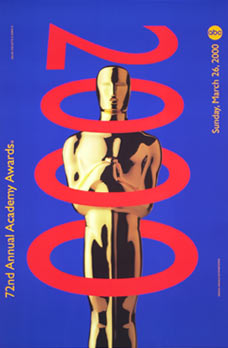
The 72nd Academy Awards ceremony, presented by the Academy of Motion Picture Arts and Sciences (AMPAS), honored films released in 1999 and took place on March 26, 2000, at the Shrine Auditorium in Los Angeles, beginning at 5:30 p.m. PST / 8:30 p.m. EST. During the ceremony, the AMPAS presented Academy Awards in 23 categories. The ceremony, televised in the United States by ABC, was produced by husband-and-wife producing team Richard and Lili Fini Zanuck and was directed by Louis J. Horvitz. Actor Billy Crystal hosted the show for the seventh time. He first presided over the 62nd ceremony held in 1990 and had last hosted the 70th ceremony held in 1998. Three weeks earlier in a ceremony at the Regent Beverly Wilshire Hotel in Beverly Hills, California held on March 4, the Academy Awards for Technical Achievement were presented by host Salma Hayek.
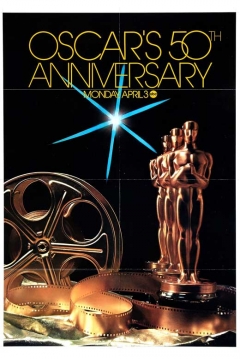
The 50th Academy Awards ceremony, presented by the Academy of Motion Picture Arts and Sciences (AMPAS), honored films released in 1977 and took place on April 3, 1978, at the Dorothy Chandler Pavilion in Los Angeles. During the ceremony, AMPAS presented Academy Awards in 22 categories. The ceremony, televised in the United States by ABC, was produced by Howard W. Koch and was directed by Marty Pasetta. Actor and comedian Bob Hope hosted the show for the 19th time. He first presided over the 12th ceremony held in 1940 and had last served as a co-host of the 47th ceremony held in 1975. Five days earlier, in a ceremony held at The Beverly Hilton in Beverly Hills, California, on March 29, the Academy Scientific and Technical Awards were presented by hosts Kirk Douglas and Gregory Peck.

The Milwaukee Journal Sentinel is a daily morning broadsheet printed in Milwaukee, Wisconsin, where it is the primary newspaper and also the largest newspaper in the state of Wisconsin, where it is widely read. It was purchased by the Gannett Company in 2016.
The 25th Academy Awards were held on March 19, 1953 at the RKO Pantages Theatre in Hollywood, and the NBC International Theatre in New York City, to honor the films of 1952. It was the first Oscars ceremony to be televised, the first ceremony to be held in Hollywood and New York simultaneously, and the only year in which the New York ceremonies were held in the NBC International Theatre on Columbus Circle, which was shortly thereafter demolished and replaced by the New York Coliseum.

The Gerald Loeb Awards, also referred to as the Gerald Loeb Awards for Distinguished Business and Financial Journalism, is a recognition of excellence in journalism, especially in the fields of business, finance and the economy. The award was established in 1957 by Gerald Loeb, a founding partner of E.F. Hutton & Co. Loeb's intention in creating the award was to encourage reporters to inform and protect private investors as well as the general public in the areas of business, finance and the economy.

Adult Video News is an American trade magazine that covers the adult video industry. The New York Times notes that AVN is to pornographic films what Billboard is to records. AVN sponsors an annual convention, called the Adult Entertainment Expo or AEE, in Las Vegas, Nevada along with the AVN Awards, an award show for the adult industry modeled after the Oscars.

The 58th Academy Awards ceremony, organized by the Academy of Motion Picture Arts and Sciences (AMPAS), took place on March 24, 1986, at the Dorothy Chandler Pavilion in Los Angeles beginning at 6:00 p.m. PST / 9:00 p.m. EST. During the ceremony, AMPAS presented Academy Awards in 23 categories honoring films released in 1985. The ceremony, televised in the United States by ABC, was produced by Stanley Donen and directed by Marty Pasetta. Actors Alan Alda, Jane Fonda, and Robin Williams co-hosted the show. Fonda hosted the gala for the second time, having previously been a co-host of the 49th ceremony held in 1977. Meanwhile, this was Alda and Williams's first Oscars hosting stint. Eight days earlier, in a ceremony held at The Beverly Hilton in Beverly Hills, California, on March 16, the Academy Awards for Technical Achievement were presented by host Macdonald Carey.
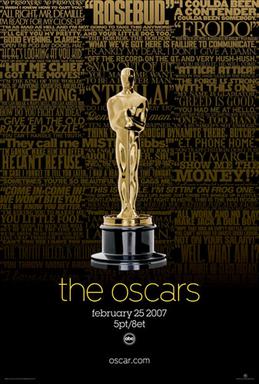
The 79th Academy Awards ceremony, presented by the Academy of Motion Picture Arts and Sciences (AMPAS), honored the best films of 2006 and took place February 25, 2007, at the Kodak Theatre in Hollywood, Los Angeles beginning at 5:30 p.m. PST / 8:30 p.m. EST. During the ceremony, the Academy of Motion Picture Arts and Sciences presented Academy Awards in 24 categories. The ceremony, televised in the United States by ABC, was produced by Laura Ziskin and directed by Louis J. Horvitz. Actress Ellen DeGeneres hosted for the first time. Two weeks earlier in a ceremony at the Beverly Wilshire Hotel in Beverly Hills, California held on February 10, the Academy Awards for Technical Achievement were presented by host Maggie Gyllenhaal.

The 51st Academy Awards ceremony, organized by the Academy of Motion Picture Arts and Sciences (AMPAS), honored films released in 1978 and took place on April 9, 1979, at the Dorothy Chandler Pavilion in Los Angeles, beginning at 7:00 p.m. PST / 10:00 p.m. EST. During the ceremony, AMPAS presented Academy Awards in 23 categories. The ceremony, televised in the United States by ABC, was produced by Jack Haley Jr. and directed by Marty Pasetta. Comedian and talk show host Johnny Carson hosted the show for the first time. Three days earlier, in a ceremony held at The Beverly Hilton in Beverly Hills, California, the Academy Awards for Technical Achievement were presented by hosts Gregory Peck and Christopher Reeve.
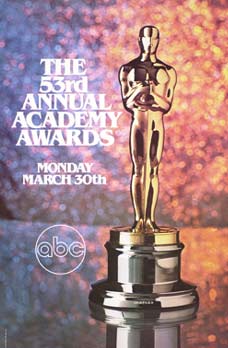
The 53rd Academy Awards ceremony, organized by the Academy of Motion Picture Arts and Sciences (AMPAS), honored films released in 1980 and took place on March 31, 1981, at the Dorothy Chandler Pavilion in Los Angeles, beginning at 7:00 p.m. PST / 10:00 p.m. EST. The ceremony was scheduled to take place originally on the previous day but was postponed due to the attempted assassination of Ronald Reagan. During the ceremony, AMPAS presented Academy Awards in 20 categories. The ceremony, televised in the United States by ABC, was produced by Norman Jewison and directed by Marty Pasetta. Comedian and talk show host Johnny Carson hosted the show for the third consecutive time. Two weeks earlier, in a ceremony held at The Beverly Hilton in Beverly Hills, California, on March 15, the Academy Scientific and Technical Awards were presented by hosts Ed Asner and Fay Kanin.
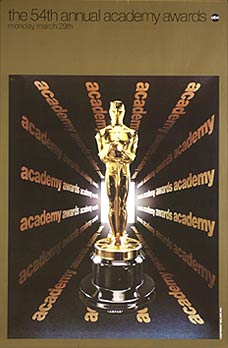
The 54th Academy Awards ceremony, organized by the Academy of Motion Picture Arts and Sciences (AMPAS), honored films released in 1981 and took place on March 29, 1982, at the Dorothy Chandler Pavilion in Los Angeles. During the ceremony, AMPAS presented Academy Awards in 22 categories. The ceremony, televised in the United States by ABC, was produced by Howard W. Koch and directed by Marty Pasetta. Comedian and talk show host Johnny Carson hosted the show for the fourth consecutive time.
The Robert F. Kennedy Awards for Excellence in Journalism is a journalism award named after Robert F. Kennedy and awarded by the Robert F. Kennedy Center for Justice and Human Rights. The annual awards are issued in several categories and were established in December 1968 by a group of reporters who covered Kennedy's campaigns. Winners are judged by more than 50 journalists each year, led by a committee of six independent journalists. The awards honor reporting "on issues that reflect Robert F. Kennedy's concerns, including human rights, social justice and the power of individual action in the United States and around the world. Entries include insights into the causes, conditions and remedies of injustice and critical analysis of relevant public policies, programs, attitudes and private endeavors." The awards are known as the "poor people's Pulitzers" in media circles.

The Motion Picture Herald (MPH) was an American film industry trade paper first published as the Exhibitors Herald in 1915, and MPH from 1931 to December 1972. It was replaced by the QP Herald, which only lasted until May 1973.
The Gerald Loeb Award is given annually for multiple categories of business reporting. The "Magazine" category is one of the two original categories awarded in 1958, with the last award given in 2014. The category included articles published the prior year in national and regional periodicals until 2008, when it was expanded to include magazine supplements to newspapers. Previously, newspaper magazine supplements were entered into an appropriate newspaper category. The "Magazine" and "Large Newspaper" categories were replaced by the "Feature" category in 2015.
The Gerald Loeb Award is given annually for multiple categories of business reporting. Special awards were occasionally given for distinguished business journalism that doesn't necessarily fit into other categories.
Joseph Arnold Livingston was an American business journalist and economist known for his long-running syndicated economics column for which he received a Pulitzer Prize and three Gerald Loeb Awards. He created the Livingston Survey, a twice-yearly economic forecast survey he personally conducted from 1946 until his death in 1989.
References
- 1 2 "Louis Guenther publisher here". The New York Times . Vol. CII, no. 34746 (Late City ed.). March 12, 1953. p. 27.
- 1 2 "The Financial World". Financial World. Vol. 1, no. 1. Chicago. October 1, 1902. pp. 1, 8.
- ↑ "Important announcement". Financial World. Vol. 3, no. 12. Chicago: Louis Guenther. September 1, 1905. p. 1.
- ↑ "A weekly September 1st". Financial World. Vol. 5, no. 9. Chicago: The Financial World Publishing Co. August 1, 1906. p. 1.
- ↑ "Group Gains Control Of 'Financial World'". Des Moines Register . Vol. 107, no. 92. New York, New York. Associated Press. September 20, 1955. p. 20.
- ↑ "Ralph Bach Dies On 70th Birthday". The Item of Millburn and Short Hills. Vol. 84, no. 5. February 1, 1973. p. 13.
- 1 2 Weingarten, Robert I.; Kingon, Alfred H. (December 1, 1975). "A note to our readers". Financial World. Vol. 144, no. 22. New York, New York: FW Publishing Corporation. p. 4.
- ↑ Dougherty, Philip H. (Dec 29, 1983). "Financial Magazine's New Era". Advertising. The New York Times . Vol. CXXXIII, no. 45907 (late ed.). p. D13.
- 1 2 Leonard, Devin (3 August 1998). "Financial World Magazine Collapses Under Gung-Ho Owner Barry Rupp". The New York Observer. Retrieved 19 February 2016.
- ↑ Abrams, Margaret. "A Trend Forecaster Tells Us What to Expect for Spring 2018". The New York Observer . Archived from the original on 25 October 2009. Retrieved 19 February 2016.
- 1 2 3 4 Smith, Weston (June 30, 1943). "Annual survey of annual stockholder reports". Financial World. Vol. 79, no. 26. New York, New York: Guenther Publishing Corporation. pp. 3–4, 24–26.
- 1 2 3 Smith, Weston (July 5, 1944). "Annual survey of annual stockholder reports". Financial World. Vol. 82, no. 1. New York, New York: Guenther Publishing Corporation. pp. 3–4, 27–32.
- ↑ "Announcing the Formation of an Independent Board of Experts". Financial World. Vol. 82, no. 1. New York, New York: Guenther Publishing Corporation. July 5, 1944. p. 4.
- ↑ "Report of Independent Experts". Financial World. Vol. 82, no. 6. New York, New York: Guenther Publishing Corporation. August 9, 1945. p. 5.
- ↑ "'Best of Industry' Selections for 1944 Annual Reports". Financial World. Vol. 83, no. 14. New York, New York: Guenther Publishing Corporation. October 3, 1945. p. 5.
- 1 2 3 "Prizes are awarded". The Cincinnati Enquirer . Vol. CV, no. 177 (Final ed.). New York. Associated Press. October 3, 1945. p. 15.
- 1 2 "'New Haven' Wins Group Award For Annual Report Ads". Hartford Courant . Vol. CXII (Final City ed.). Associated Press. October 22, 1948. p. 20.
- ↑ "Warnaco report wins top 'Oscar'". The Bridgeport Post . Vol. XCII, no. 250 (County ed.). October 24, 1975. p. 36.
- 1 2 "Harleysville Annual Report Wins Financial World Award". News-Herald (Perkasie, Pennsylvania) . Vol. 95, no. 4930. November 19, 1975. p. 18.
- ↑ "Snyder sees need to keep taxes up". The New York Times . Vol. XCVI, no. 32396 (Late City ed.). October 5, 1946. p. 21.
- ↑ "Canadian Reports Win High Honors". The Gazette (Montreal) . Vol. 170. October 11, 1947. p. 12.
- ↑ Suttle, Howard. "Industry 'Oscars' Awarded". Liftin' the Lid on Washington. Shreveport Journal . Vol. 54 (Wednesday Afternoon ed.). p. 6.
- ↑ "Sloan urges all to acquire stock". The New York Times . Vol. C, no. 33883 (Late City ed.). October 31, 1950. p. 43.
- ↑ Kellum, Robert (October 31, 1951). "Erie Gets The Oscar For Annual Report". The Indianapolis Star . Vol. 49, no. 148. p. 26.
- ↑ "Monsanto wins report trophy". Wilmington Morning News . Vol. 142, no. 104 (Latest City ed.). New York. Associated Press. October 29, 1952. p. 46.
- ↑ "Illinois Central Wins Gold Oscar". The New York Times . Vol. CIII, no. 34975 (Late City ed.). October 27, 1953. p. 39.
- ↑ "Kodak top winner with year report". The New York Times . Vol. CIV, no. 35339 (Late City ed.). October 26, 1954. p. 40.
- ↑ "Pennsy line wins prize for report". The New York Times . Vol. CV, no. 35703 (Late City ed.). October 25, 1955. p. 45.
- ↑ "Southam Co. Wins Trophy". Calgary Herald . Vol. 73, no. 250 (Final ed.). New York. Associated Press. October 30, 1956. p. 30.
- ↑ "Gold Award for 1956 Stockholders Report To Marquette Cement". St. Louis Globe-Democrat . Vol. 83, no. 140. October 29, 1957. p. 27.
- ↑ "Ford Wins 'Oscar of Industry' Award For Best Annual Report Issued for '57". The New York Times . Vol. CVIII, no. 36802 (Late City ed.). October 28, 1958. p. 58.
- ↑ "Hilton '58 report wins gold award". The New York Times . Vol. CIX, no. 37166 (Late City ed.). October 27, 1959. p. 49.
- 1 2 3 "Insurer wins 'Oscar'". The New York Times . Vol. CX, no. 37530 (Late City ed.). October 25, 1960. p. 51.
- ↑ "American Electric wins report trophy". News Items on Business Activities Over the Nation. The Tampa Tribune . Vol. 67, no. 305. Associated Press. November 1, 1961. p. 9-C.
- ↑ Record, Don (October 31, 1962). "U.S. Steel Cuts Dividend". Business Chronicler. Democrat and Chronicle . Vol. 130. p. 30.
- ↑ "G.E. Annual Report Wins Financial World's Award". The New York Times . Vol. CXIII, no. 38631 (Late City ed.). October 31, 1963. p. 41.
- 1 2 3 "Xerox Corp. Wins Award For Its Stockholder Report". The New York Times . Vol. CXIV, no. 38993 (Late City ed.). October 28, 1964. p. 67.
- ↑ "Xerox to Get Silver Oscar". Democrat and Chronicle . Vol. 133 (Metropolitan ed.). October 26, 1965. p. 1C.
- ↑ Lockwood, Leonard (October 27, 1966). "Eastman Kodak Gets 'Oscar' for Report". Democrat and Chronicle . Vol. 134 (Metropolitan ed.). New York. p. 1C.
- ↑ "Glidden to Get Oscar For Its Annual Report". The New York Times . Vol. CXVII, no. 40086 (Late City ed.). October 25, 1967. p. 72.
- ↑ "NA Rockwell To Get Award". Pittsburgh Post-Gazette . Vol. 42, no. 70 (Final City ed.). October 21, 1968. p. 43.
- ↑ Vanderschmidt, Bill (October 30, 1969). "L. M. Berry Co. Branches Out". Business/People. Democrat and Chronicle . Vol. 137 (Metro ed.). p. 1C.
- ↑ "'Sell Anything' Stock Era Past". San Francisco Examiner . Vol. 106, no. 121 (9 Star Final ed.). New York. Associated Press. October 29, 1970. p. 56.
- ↑ "Eastern Air Lines to Get Trophy for Its '70 Report". The New York Times . Vol. CXXI, no. 41548 (Late City ed.). October 26, 1971. p. 66.
- ↑ "Award Is Won by Retailer For Corporation Report". The New York Times . Vol. CXXII, no. 41914 (Late City ed.). October 26, 1972. p. 65.
- ↑ "Hart, Case-Hoyt Award Winners". Democrat and Chronicle . Vol. 141 (Metro ed.). October 31, 1973. p. 8D.
- ↑ Sherman, Howard L.; Nevans, Ronald (October 30, 1974). "1974 Annual Report Awards Section". Financial World. Vol. 142, no. 17. New York, New York: Butler Publishing Corporation. pp. 62–63.
- ↑ Cole, Joe (October 26, 1975). "Merrill Lynch has real winner". The Arizona Republic . Vol. 86, no. 163. p. B11.
- ↑ "Lowe's Reports". Business Activities. The Robesonian . Vol. CVII, no. 204. October 25, 1976. p. 8.
- ↑ "LCO Takes Top Award". Lebanon Daily News . Vol. 107, no. 43. October 28, 1978. p. 9.
- ↑ "Annual report winners". Business Beat. The Daily Item . Vol. 80, no. 239. October 26, 1979. p. 6.
- ↑ "Vulcan Report Honored". The Leaf-Chronicle . Vol. 177, no. 300. October 27, 1985. p. 8B.
- ↑ "GMP wins bronze award for annual report". The Brattleboro Reformer . Vol. 76, no. 197. October 21, 1988. p. 6.
- ↑ "PepsiCo report judged No. 1". The Herald Statesman . October 25, 1990. p. D1.
- ↑ Lee, Patrick (October 26, 1991). "Arco 1990 Annual Report wins Award From Financial Analysts". Los Angeles Times . Vol. CX, no. 327. p. D2.
- ↑ "In the region". Update. The Morning Call . No. 36542. October 23, 1992. p. B9.
- ↑ "Roadway, Michelin, Knight-Ridder tops". Daily Backgrounder. Akron Beacon Journal . October 28, 1994. p. B8.
- ↑ "Annual reports for Tecnol, AMR, Tandy win awards". Fort Worth Star-Telegram . Vol. 90, no. 181. October 23, 1995. p. 6.
- ↑ "Interstate/Johnson Lane's CEO earns Bronze Award". The Index Journal. Vol. 76, no. 49 (Sunday ed.). April 3, 1994. p. 5B. |
- 1 2 Davis, Pati (April 21, 1983). "S&L presifdent wins national honors". Fort Myers News-Press . Vol. 99, no. 151. p. 17A.
- ↑ Barton, Lee (March 26, 1975). "Selecting the Outstanding Corporate Chiefs". Financial World. Vol. 143, no. 13. pp. 16–17.
- ↑ Wax, Alan J. (March 15, 1976). "The selection of America's outstanding chiefs". Financial World. Vol. 145, no. 6. New York, New York: FW World Publishing. p. 26.
- ↑ "Dan Dorfman Joins Magazine". The New York Times . 4 December 1996. Retrieved 19 February 2016.
- ↑ Fabrikant, Geraldine (11 March 1992). "Vogue's Plans for Centennial - A Big Issue and a Big Party". The New York Times. Retrieved 19 February 2016.
- ↑ Livingston, Joseph A. (October 28, 1979). "An idea whose time hadn't come". The Philadelphia Inquirer . Vol. 301, no. 120. p. 18 Today section. Retrieved March 30, 2020– via Newspapers.com.
- ↑ "Douglas A. McIntyre". Huffington Post. Retrieved 19 February 2016.